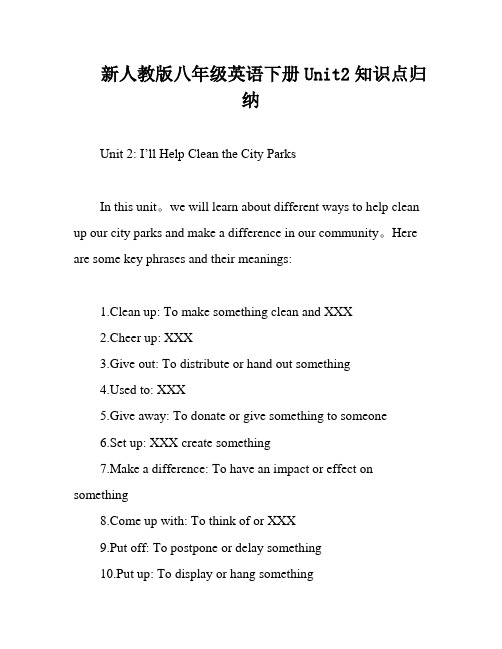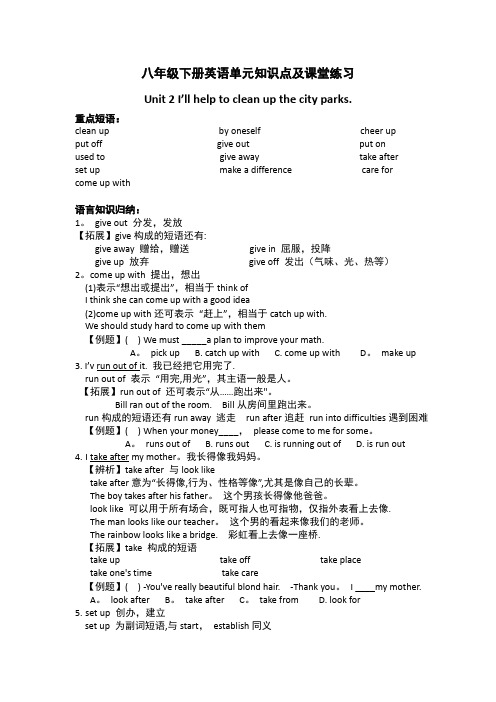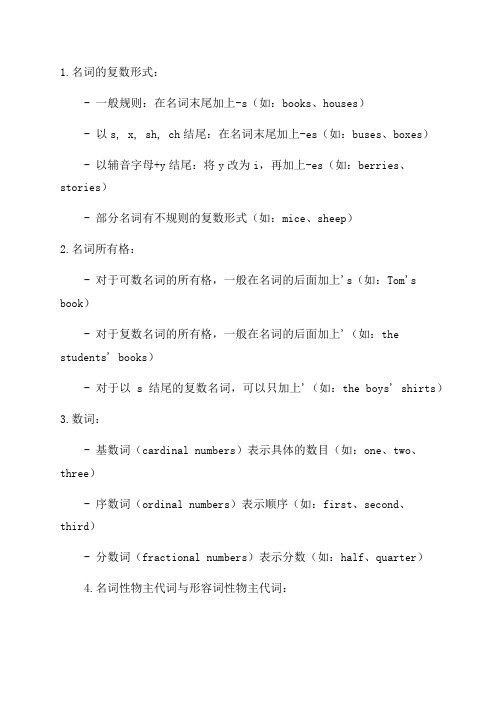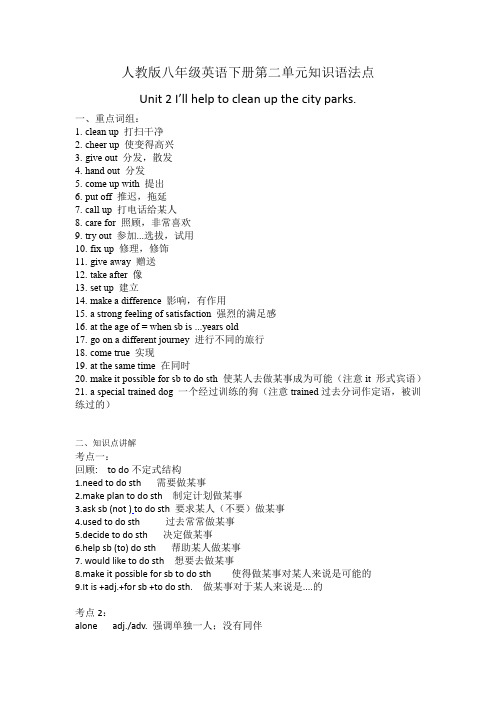初二英语下册复习要点2
完整版)人教版八年级英语下册第二单元知识点归纳总结

完整版)人教版八年级英语下册第二单元知识点归纳总结Unit 2: I'll Help Clean Up the City ParksIn our community。
we have many beautiful parks that we can enjoy。
However。
sometimes people leave trash and litter behind。
which can make the parks look messy and uninviting。
That's why I'm excited to help clean up the city parks with my friends。
We plan to set up a le and make a plan to clean up different parks each week。
We'll gather our XXX each other up as we work to make a difference in our community。
We'll also give out flyers and talk to people in the community to encourage them to help keep the parks clean。
We believe that if we all work together。
we can make it possible for everyone to enjoy the parks in a clean and safe environment。
I used to think that one person couldn't make a difference。
but I've XXX caring for our community。
新人教版八年级英语下册Unit2知识点归纳

新人教版八年级英语下册Unit2知识点归纳Unit 2: I’ll Help Clean the City ParksIn this unit。
we will learn about different ways to help clean up our city parks and make a difference in our community。
Here are some key phrases and their meanings:1.Clean up: To make something clean and XXX2.Cheer up: XXX3.Give out: To distribute or hand out somethinged to: XXX5.Give away: To donate or give something to someone6.Set up: XXX create something7.Make a difference: To have an impact or effect on somethinge up with: To think of or XXX9.Put off: To postpone or delay something10.Put up: To display or hang somethingHere are some usage notes to keep in XXX:1.Need to do something: To require or be necessary to do something2.Make plans to do something: To create a plan or strategy for doing something3.Ask someone (not) to do something: To request or demand that someone (not) do somethinged to do something: To refer to a past XXX5.Decide to do something: To make a XXX do something6.Help someone (to) do something: To assist or aid someone in doing something7.Make a difference to: To have an impact or effect on something8.Make it possible for someone to do something: To enable or XXX do somethingNow。
牛津译林版八年级英语下册Unit2重点知识复习及练习(20200707215651)

牛津译林版八年级英语下册Unit2重点知识复习及练习【板块一:重要词汇】【基础知识】1.miss:(1)miss为动词,意为“想念,思念”。
如:When I was abroad, I my parents. 当我在国外时,我思念我的父母。
(2)miss 还可意为“错过,没赶上”。
如:Hurry up, or you may the bus. 快点,否则你可能赶不上公共汽车。
(3)Miss 可做名词,意为“小姐”,后接姓氏,常常大写。
如:This is my English teacher, . 这是我的英语老师,李小姐。
2.fantastic 为形容词,意为“极好的,美妙的”,其同义词为wonderful。
have a fantastic time 也可说成have a good/great/wonderful time。
如:I have a social life. 我的社交生活丰富多彩。
3.speed:(1)speed作名词,速度,常见短语为at the/a speed of 以……的速度;at…speed。
如:Please drive at (a) safe . 请以安全速度行驶。
It moves fifty kilometers an hour. 他以每小时50公里的速度移动。
(2)speed 可作动词,其动词组为speed up, 意为“加速”。
如:You notice that your breathing has a bit. 你注意到自己的呼吸加快了一些。
4.through作介词,自始至终,从头到尾;穿过,通过。
如:The river runs our village. 这条河穿过我们的村子。
辨析across和through两者均可表示“横过,穿过”,前者across表示从某物的表面“横过”,而后者则指在里面或在空间范围内“穿过”。
如:I draw a line the page. 我在那一页上面画了一条线。
八年级英语下册Unit2重要知识点及课堂练习

八年级下册英语单元知识点及课堂练习Unit 2 I’ll help to clean up the city parks.重点短语:clean up by oneself cheer upput off give out put onused to give away take afterset up make a difference care forcome up with语言知识归纳:1。
give out 分发,发放【拓展】give构成的短语还有:give away 赠给,赠送give in 屈服,投降give up 放弃give off 发出(气味、光、热等)2。
come up with 提出,想出(1)表示“想出或提出”,相当于think ofI think she can come up with a good idea(2)come up with还可表示“赶上”,相当于catch up with.We should study hard to come up with them【例题】( ) We must _____a plan to improve your math.A。
pick up B. catch up with C. come up with D。
make up 3. I’v run out of it. 我已经把它用完了.run out of 表示“用完,用光”,其主语一般是人。
【拓展】run out of 还可表示“从……跑出来"。
Bill ran out of the room. Bill从房间里跑出来。
run构成的短语还有run away 逃走run after追赶run into difficulties遇到困难【例题】( ) When your money____,please come to me for some。
A。
runs out of B. runs out C. is running out of D. is run out4.I take after my mother。
八年级下英语第二单元知识点

1.名词的复数形式:- 一般规则:在名词末尾加上-s(如:books、houses)- 以s, x, sh, ch结尾:在名词末尾加上-es(如:buses、boxes)- 以辅音字母+y结尾:将y改为i,再加上-es(如:berries、stories)- 部分名词有不规则的复数形式(如:mice、sheep)2.名词所有格:- 对于可数名词的所有格,一般在名词的后面加上's(如:Tom's book)- 对于复数名词的所有格,一般在名词的后面加上'(如:the students' books)- 对于以s结尾的复数名词,可以只加上'(如:the boys' shirts)3.数词:- 基数词(cardinal numbers)表示具体的数目(如:one、two、three)- 序数词(ordinal numbers)表示顺序(如:first、second、third)- 分数词(fractional numbers)表示分数(如:half、quarter)4.名词性物主代词与形容词性物主代词:- 名词性物主代词(possessive pronouns)用来替代名词,并表示所有关系(如:mine、yours、his)- 形容词性物主代词(possessive adjectives)用来修饰名词,并表示所有关系(如:my、your、his)5.数词的计量单位:- 时间单位:hour、minute、second- 重量单位:gram、kilogram6.物品价格的表示方法:- 表示完整价格的句子结构:it costs + 价格(如:It costs five dollars.)- 表示价格范围的句子结构:from + 较低的价格 + to + 较高的价格(如:The price ranges from ten to twenty dollars.)7.数词的用法:- 表示年龄(如:She is fifteen years old.)- 表示日期(如:Today is the fifteenth of June.)- 表示顺序(如:He came in second place.)8.动词:- 动词的现在进行时表示正在进行的动作(如:She is eating dinner.)- 动词的过去式表示过去发生的动作(如:He went to school yesterday.)- 动词的过去分词(如:played、eaten)用来构成完成时态和被动语态。
人教版八年级英语下册第二单元复习知识语法点

人教版八年级英语下册第二单元知识语法点Unit 2 I’ll help to clean up the city parks.一、重点词组:1.clean up 打扫干净2.cheer up 使变得高兴3.give out 分发,散发4.hand out 分发e up with 提出6.put off 推迟,拖延7.call up 打电话给某人8.care for 照顾,非常喜欢9.try out 参加...选拔,试用10.fix up 修理,修饰11.give away 赠送12.take after 像13.set up 建立14.make a difference 影响,有作用15.a strong feeling of satisfaction 强烈的满足感16.at the age of = when sb is ...years old17.go on a different journey 进行不同的旅行e true 实现19.at the same time 在同时20.make it possible for sb to do sth 使某人去做某事成为可能(注意it 形式宾语)21.a special trained dog 一个经过训练的狗(注意trained过去分词作定语,被训练过的)二、知识点讲解考点一:回顾: to do不定式结构1.need to do sth 需要做某事2.make plan to do sth 制定计划做某事3.ask sb (not )to do sth 要求某人(不要)做某事ed to do sth 过去常常做某事5.decide to do sth 决定做某事6.help sb (to) do sth 帮助某人做某事7. would like to do sth 想要去做某事8.make it possible for sb to do sth 使得做某事对某人来说是可能的9.It is +adj.+for sb +to do sth. 做某事对于某人来说是....的考点2:alone adj./adv. 强调单独一人;没有同伴lonely adj. 孤独的;寂寞的带有强烈的感情色彩feel lonely 感到孤独考点3:run of “被用完;被耗尽”, 主语通常是时间、金钱、食物等无生命的名词Eg. Her money has already run out. 她的钱已经被用完了run out of :用完主语只能是人She has already run out of money. 她已经花光了钱run--ran--run (原形--过去式--过去分词)考点4:---ing/---ed 形容词的考点:---ing修饰物;---ed修饰人boring adj.无聊的bored adj. 感到无聊的① exciting adj.令人兴奋的excited adj. 感到兴奋的be excited about 因...而兴奋② satisfied adj.满意的;满足的近义词:pleasedv. satisfy v.使满意;使满足n. satisfaction 满意;满足be satisfied with sth = be pleased with 对...满意考点5:advice n.建议;劝告不可数名词没有单复数一条建议:a piece of advice 一些建议:some adviceask for advice 征求建议听从某人的建议:take/ follow one’s advice近义词:suggestion n.建议(可数名词)v. advise /ədˈvaɪz/advise sb to do sth 建议某人做某事advise sb not to do sth 建议某人不要去做某事考点6:--ness名词后缀happy adj. ---happiness n. 幸福;快乐sad adj. --- sadness n.悲伤kind adj. ---kindness 仁慈;好意考点7:volunteer /ˌvɒlənˈtɪə(r)/ v.义务做;自愿做n.志愿者复数:volunteers volunteer to do sth 自愿做某事考点8:fight /faɪt/ v.打仗;打架fighter n. 战士have /take a fight with sb 和某人打架;打仗fight against 与....抗争例1: I don’t want to have a fight_______my cousin.A.withB.forC.atD.to考点9:动词+offput off 推迟take off 脱掉;起飞get off 下车show off 炫耀cut off 切除;切断give off 分发;散发turn off 关闭set off 出发考点10use的用法ed to do sth. 过去常常做某事例句:I didn’t use to go skating,but now I do it very often.我过去不经常去滑冰,但我现在经常去。
八下英语二单元知识点
八下英语二单元知识点八年级下册英语第二单元主要围绕着“日常活动”这一主题展开,涉及了学生们在学校和家中进行的各种活动,包括学习、运动、娱乐等。
以下是本单元的重点知识点详解,帮助同学们更好地掌握和运用所学知识。
一、重点词汇日常活动类词汇:study(学习)、play(玩耍)、eat(吃)、sleep(睡觉)、wash(洗漱)、shop (购物)等。
学校生活相关词汇:class(课程)、homework(作业)、test(考试)、library(图书馆)、playground (操场)等。
运动类词汇:swim(游泳)、play tennis(打网球)、ride a bike(骑自行车)、climb mountains (爬山)等。
频度副词:always(总是)、usually(通常)、often(经常)、sometimes(有时)、never(从不)等。
二、重点短语日常活动短语:go to the movies(去看电影)、go shopping(去购物)、play computer games (玩电脑游戏)、do housework(做家务)等。
学校生活短语:have a test(参加考试)、go to the library(去图书馆)、play sports(做运动)、after-school activities(课后活动)等。
运动类短语:play tennis with sb.(和某人一起打网球)、go swimming(去游泳)、ride a bike to school(骑自行车上学)等。
三、重点句型询问某人通常做什么活动的句型:What do you usually do on weekends? 你周末通常做什么?描述某人一周内活动安排的句型:On Monday, I usually ... 周一我通常……;On the weekend, I sometimes ... 周末我有时……使用频度副词谈论日常活动的句型:I always get up at 6:30 in the morning. 我总是早上6:30起床。
人教版八年级下册英语Unit 2知识点汇总
人教版八年级下册英语Unit 2知识点汇总一、常考短语clean up 打扫(或清除)干净cheer up(使)变得更高兴;振奋起来give out 分发;散发come up with 想出提出(主意、计划、回答等)put off 推迟hand out 分发call up 打电话给(某人);征召used to曾经……“;过去…care for照顾;非常喜欢try out参加………选拔;试用fix up修理;装饰give away赠送;捐赠take after(外貌或行为)像set up 建起;设立make a difference 影响;有作用put up 张贴;搭建;举起help out 帮助……摆脱困境give up 放弃come true 实现run out of 用尽;耗尽be similar to 与………相似volunteer to do sth 自愿做某事make plans to do sth 制订计划做某事ask sb (not) to do sth 要求某人(不要)做某事used to do sth 过去常常做某事give up+时间+to do sth腾出时间做某事get a feeling of 产生…的感觉decide to do sth 决定做某事help sb (to) do sth帮助某人做某事make a difference to对…产生影响make it possible for sb to do sth使得做某事对某人来说成为可能三、经典句型1.You could help to clean up the city parks. A(9)你可以帮助打扫城市公园。
(1)could意为“能;可以”,其后接动词原形,可以用于提出建议,语气比can委婉。
You could walk to the park.你可以步行去公园。
拓展:could表示过去的能力时,是can的过去式。
八年级下册英语笔记重点归纳
八年级下册英语笔记重点归纳一、Unit 1 What's the matter?1. 重点单词。
- matter n.问题;事情。
常用搭配:What's the matter (with sb.)?(某人)怎么了?- have a cold 感冒。
类似的表达还有:have a fever(发烧),have a cough (咳嗽)等。
- stomachache n.胃痛;腹痛。
“-ache”为后缀,表示疼痛,如:headache (头痛),toothache(牙痛)。
- foot n.脚,复数形式为feet。
- lie v.躺;平躺。
lie - lay - lain。
例如:You should lie down and rest.(你应该躺下休息。
)- rest v. n.放松;休息。
如:take a rest(休息一下)。
2. 重点短语。
- take one's temperature 量体温。
例如:The nurse took my temperature.(护士给我量了体温。
)- take breaks (take a break) 休息。
We should take breaks when we are tired.(当我们累的时候应该休息。
)- get off 下车。
He got off the bus at the next stop.(他在下一站下了公共汽车。
)- to one's surprise 使……惊讶的是;出乎……的意料。
To my surprise, he passed the exam.(令我惊讶的是,他通过了考试。
)- What should I do? 我应该做什么?用于询问建议。
- You should see a dentist and get an X - ray. 你应该去看牙医并且拍个X 光片。
should为情态动词,后接动词原形,表示建议。
八年级英语下册Unit 2重点短语及句型总汇
八年级英语下册 Unit 2 重点短语及句型总汇一、重点短语1.look after:照顾,照料2.take care of:照顾,照料3.look forward to:期待,盼望4.at the moment:此刻,目前5.take a message:捎个口信6.all day:整天,一整天7.get back to:回复,回电8.leave a message:留个信息9.make a decision:做决定10.at present:目前,现在11.call back:回电,回复电话12.by the way:顺便说一下,顺便问一下13.take turns:轮流,依次14.in the past:在过去15.right away:立刻,马上16.as soon as possible:尽快,早日17.be good at:擅长于18.take a break:休息一会儿19.on the phone:打电话,通过电话20.in the end:最后,终于二、重点句型1.Can you take care of my dog while I’m away?–当我不在的时候,你能照顾我的狗吗?2.I’m really looking forward to your visit next week.–我真的很期待你下周的访问。
3.Sorry, he’s not available at the moment. Can I take a message?–对不起,他现在不在。
我可以捎个口信吗?4.Please call me back as soon as possible.–请尽快给我回电。
5.By the way, have you made a decision about the school trip?–顺便问一下,你对学校的旅行做了决定吗?6.Let’s take turns to help with the cleaning.–我们轮流来帮忙打扫吧。
- 1、下载文档前请自行甄别文档内容的完整性,平台不提供额外的编辑、内容补充、找答案等附加服务。
- 2、"仅部分预览"的文档,不可在线预览部分如存在完整性等问题,可反馈申请退款(可完整预览的文档不适用该条件!)。
- 3、如文档侵犯您的权益,请联系客服反馈,我们会尽快为您处理(人工客服工作时间:9:00-18:30)。
初二英语下册复习要点Unit 6 How long have you been collecting shells?1.初步掌握现在完成进行时的用法2.掌握since,for 的不同用法3. little,few,many,much的比较级和最高级及用法一、重点单词省二、重点短语省三、辨析1. since,forSince:①作连词,引导时间状语从句,从句用一般过去时,主句常用完成时。
I have been teaching in this school since I graduated from university.自从大学毕业我就一直在这个学校教书②作介词。
意为自从···,自···以来,后可跟过去时间点,过去时间段+ago ,一般过去时的句子,一般过去时+过去时间点。
常用与现在完成时的句子中。
也可用于句型:it’s ```years since+一般过去时It`s two years since I came to China/自从我到中国已经两年了。
For: 介词,其后只能加一段时间,可用于现在完成时,现在完成进行时,一般现在时,一般过去时句中。
2.raise的多种用法A 筹集raise money 筹集资金B 作及物动词表“抬起,举起,提高”C 作及物,“种植,饲养,养育“例:It’s difficult to __ a family on a small income,.A rise上升,增加B raise C borrow D save 3.have/has been to+地点,have/has gone to+地点,have/has been in+地点三者都是现在完成时态形式①have/has been to+地点,表示“某人曾经去过某地”,现在已经回来,不在那里了①have/has gone to+地点表某人到某地去了,现在还没有回来,可能在去的途中,也可能在那里或在反回的途中。
①have/has been in+地点表某人在某处待了多长时间了例:她在开封待了两年了She has been in Kaifeng for two years.4. quite,veryA 一般情况下二者在修饰形容词时可以互换it`s not quite/very hot today.今天天气不算太热B 不定冠词A ,AN 在含二者的短语或句子中的位置不同A very+形容词+可数名词单数Quite a/an+形容词+可数名词单数四、语法现在完成进行时构成:have/has been+ 动词ing形式表一个动作或状态从过去某个时候开始,一直延续到说话的时刻还在继续进行,或者在说话时这个动作刚刚结束,常与表示一段时间的状语连用,for two years,since last year例Now that she is out of a job,Lucy ____going back to school,but she hasn’t decided yet一直在考虑,但还没结果国。
.A had consideredB consideredC has been consideringD have considered例I joined the Army ____May,2008.what about you?_ I have been a soldier ___three years.A in,forB on,inC on,forD in,since IN用于年月份之前,ON具体的某一天之前FOR 后跟时间段,SINCE 跟时间点、Unit 7 Would you mind turning down the music?三、辨析1.just,just now,right now,right away三个都可以作副词修饰动词,表示动作发生的时间,但具体意义不同,分别用于不同时态JUST 方才,刚刚,用于完成时JUST NOW 刚才,意义同a moment ago,a short time ago.用于过去时RIGHT NOW 立刻,立即,多用于将来时,也可以说成right away/at once,=in a moment 例:your mom is ill,you’d better take her to hospital right away.替换下面哪个A at times,B just now, Cat once Dlater on2.try的用法A try to do sth,设法去做某事,尽量去做某事,其否定形式try not to do sthB try doing sth 试着做某事,强调尝试做某事C try one’s best to do sth尽某人最大努力去做某事。
3.very,too,so,quite,rather都可以修饰形容词,副词,表程度“太,相当,非常”A very 应用最普遍,表非常,很,修饰形或副词,放在所修饰词之前B too “太“放形容或副词的前面C SO 如此···,那么···表明某一中物会引起某种后果,即SO所修饰词表原因,后面会有表结果的句子D QUITE,RATHER,相当,十分,意义相同,但所包修的词位置不一样quite a nice book=a rather nice bookE quite,.very 作副词时,有时可通用,“很,非常”,但在语意上有区别。
QUITE注意于表达主观的看法和态度,VERY侧重于对事实的客观的描述。
例:it`s nice___Andy__me with my English study. It`s nice of sb. To do sth 某人做某事太好了A at ,to help, B of ,to help, Cwith,help D of.help help sb with sth.帮助某人某事。
四、语法抽出请示的表述及答语1 would you mind(not)doing sth```?你介意(不)做····吗?答语,同意:no,do please,no,not at all,of course not 不同意:yes,I do mind,i`m sorry but,, Yes,you`d better not```2 could/would/will you please (not)do sth?请你(不)做···好吗?肯定回答,certainly```,sure```ok.,,no problem,,, 否定回答:sorry`````Unit 8 Why don`t you get her a scarf?三、辨析1. receive,get,acceptA “收到”强调客观上收到B “得到,获得“可能是被动接受,也可能是主动接受C “接受,领受“强调主观上接受例I received his invitation but did not accept it.我收到了他的请帖,但并没有接受他的邀请。
2.take an interest in ,be interest inA 表对····感兴趣,注重动作,INTEREST为名词,表兴趣B 表对···感兴趣,注重状态,其中是形容词,感兴趣的例He takes__in singing Song. A interests Binteresting Cinterested Dan interest3.go to bed,fall asleepA 就寝,去睡觉。
只表上床去睡这一动作。
无睡着之意,对应词组是GET UP(起床)B 睡着,入睡,表一个动作过程,侧重于自然而然入睡,有时也含有不想入睡而入睡。
例:you look so tired.well,I didn`t+动词原型___well last night.Aasleep a.,Bsleeps Csleep V. Dsleeping4.too``to,enough to```,```so````that(从句)A 太、、、而不能,TO后接动原,具否定意义,相当于not enough to```..so ```that(not从句)B ···足以能···例:这男孩太小不够上学的年龄。
The boy is too yound to go to schoolThe boy is not old enough to go to schoolThe boy is so yound that he can`t go to school5.enough的用法A 作形容词,“足够的,充分的”,作定语修饰名词,可放在名词前或后B 作副词用,通常放形容词或副词后,“足够地,充分地”例:what do you think of the lecture of li yang`s crazy english?I think it`s____,but someone thinks it`s much too___A wonderful enough,bored,B enough wounderful,boring,C wonderful enough,boring四、语法1.Why don`t you do sht?否定疑问句,“为什么不·····?”常用来征求意见和提出建议。
=why not +do sth?2.如何给别人提出建议和意见Unit 9 Have you ever been to an amusement park?1.decide 表对某事物作出判断,也表经过考虑后作出决定,Decide to do sth决定做某事decide that 从句Decide on(doing)sth决定做某事Decide not to do sth决定不做某事例they___a school trip. A decided 后不能直接接名词作宾语B decided to C decided on2.discover,invent,look for,find .find outA 发现,指发现一件原先己存在而不为人知的事物B 发明,即创造原先没有的东西C 寻找,指寻找的动作和过程D 找到,发现,指寻找的结果,通常指偶然发现E指经过观察,调查把某事物查出来,弄明白事情的真相。
